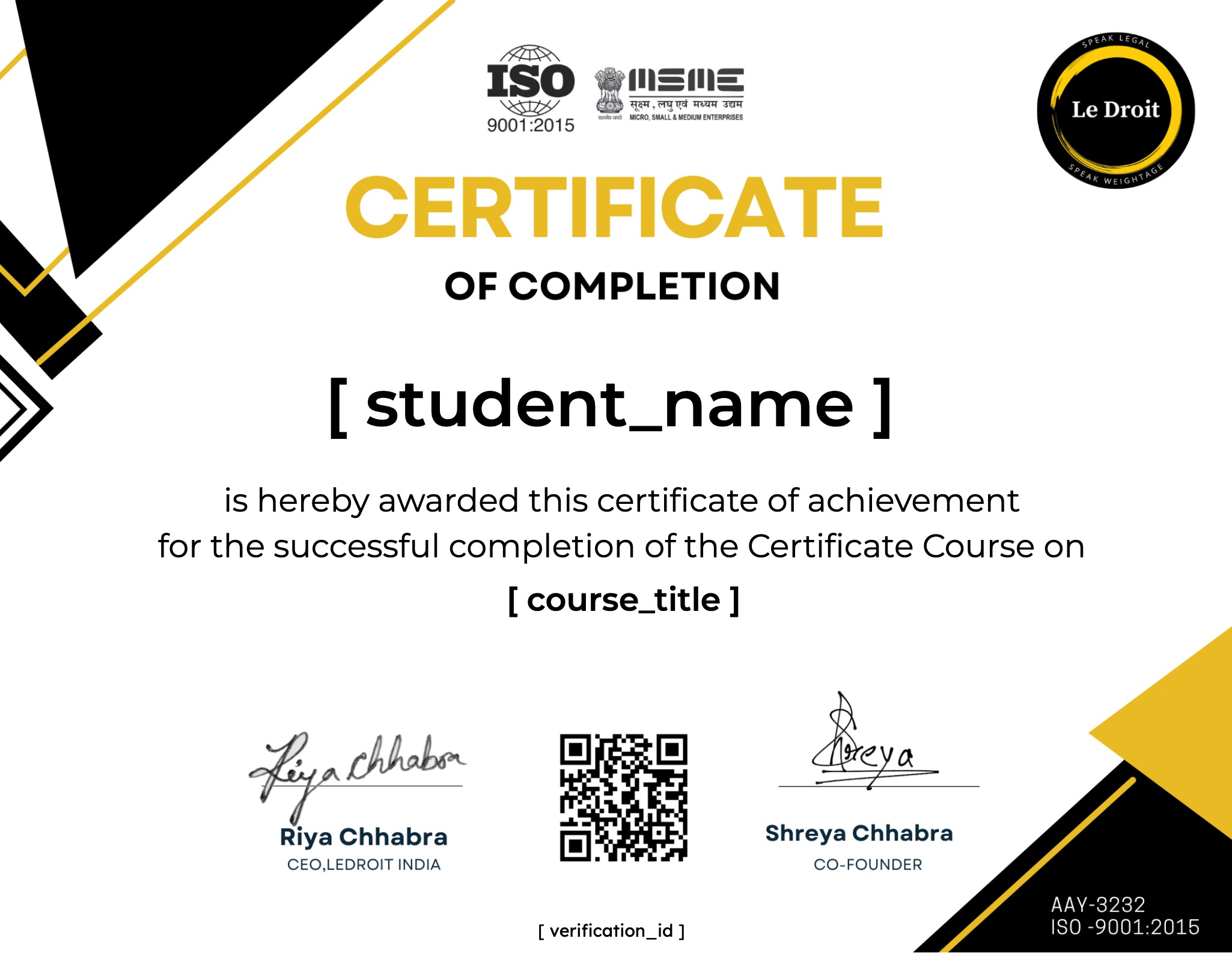0 (0 Ratings)
Advance Legal Drafting (Civil & Criminal) Live Course
What I will learn?
- Plaint
- Written Statement
- Interlocutory Application (IA)
- Affidavit
- Writ Petition (Article 226 & 32)
- Civil Revision
- Civil Appeal
- Execution Petition
- Caveat Petition
- Legal Notice (Section 80 CPC & Private)
- Criminal Complaint (Section 200 CrPC / Section 190 BNSS)
- FIR (First Information Report)
- Bail Application (Anticipatory & Regular)
- Criminal Revision
- Criminal Appeal
- Quashing of FIR (Section 482 CrPC / Section 528 BNSS)
- Power of Attorney (General & Special)
- Sale Deed
- Lease Deed
- Rent Agreement
- Will / Codicil
- Joint Venture Agreement
- Builder-Buyer Agreement
- Allotment Letters
- Gift Deed
- Practice drafting 25+ real civil and criminal documents.
Course Curriculum
Live Class Recordings (Feb 2026)
-
Day 1 | 1st Feb, 2026
57:38 -
Day 2 | 4th Feb, 2026
01:02:50 -
Day 3 | 5th Feb, 2026
01:12:45 -
Day 4 | 7th Feb, 2026
01:17:50 -
Day 5 | 9th Feb, 2026
55:37 -
Day 6 | 12th Feb, 2026
01:00:00 -
Day 8 | 17th February, 2026
01:00:00
Legal Drafting
-
How to Draft: Pleading Facts, Not Law
57:49 -
Drafting Legal Pleadings: Sequence, Strategy, and the Legal Notice.
01:05:48 -
Drafting Legal Notices for Cheque Dishonor (Section 138 N.I. Act): Maximizing Impact through Multiple Causes of Action
01:04:34 -
Drafting a Legal Notice for Defamation
01:04:06 -
Drafting Criminal Complaints: Pleading Facts, Motive, and Intent to Establish a Cognizable Offense (Part 1)
58:47 -
Drafting Criminal Complaints: Pleading Facts, Motive, and Intent to Establish a Cognizable Offense (Part 2)
01:05:13 -
Drafting Criminal Complaints Before a Magistrate: Procedure and Strategy for FIR Registration
01:05:40 -
Drafting and Understanding Affidavits: Pleading Facts on Oath and the Role of the Oath Commissioner
01:02:11 -
Drafting Civil Pleadings: Understanding CPC Order VI and VII, and the Role of Court Fees and Notices
01:01:21 -
Drafting Legal Replies: Strategy for Legal Notices and Written Statements in Civil Suits
59:00
Real Estate Agreements Drafting
-
Introduction to Real Estate Law (Part 1)
-
Introduction to Real Estate Law (Part 2)
01:30:01 -
The RERA Act and Protective Measures for Home Buyers
01:03:21 -
Contracts in Real Estate: Remedies, Types, and Importance
00:00 -
Real Estate Agreements: RERA Certificate and Drafting a Rent Agreement
01:00:00 -
Agreement to Sell vs. Sale Deed: Understanding Section 53A of the Transfer of Property Act
01:00:00 -
The Importance of Stamp Paper, Sale Deeds, and Title Search in Real Estate Transactions
01:00:00 -
Drafting of Allotment Letters and Builder-Buyer Agreements in Real Estate Projects
01:00:00 -
Builder-Buyer Agreements: Drafting, Clauses, and Essential Considerations
01:00:00 -
Drafting Joint Development Agreements in Real Estate: Roles, Risks, and Execution
01:00:00 -
Sale Deeds, Conveyance, and the Transfer of Real Estate Title
01:00:00 -
Lease Agreements and the Transfer of Property Act (Sections 105-117)
01:00:00 -
Drafting Joint Venture Agreement in Real Estate
01:00:00
Bail Drafting
-
Introduction to Bail
01:01:01 -
Types of Bail Applications
01:00:59 -
Drafting a Regular Bail Application & Case Study: Part 1
01:00:00 -
Drafting a Regular Bail Application: Case Study on Dowry Death and Domestic Violence
01:00:00 -
Anticipatory Bail: Drafting, Strategy, and Landmark Judgments.
01:08:31 -
Argument Strategy: Murder Case Study
01:04:50
Writ Petition Drafting
-
Basics of Writ Petitions: Articles 226 and 32, Jurisdiction, and Res Judicata (Part 1)
59:52 -
Basics of Writ Petitions: Articles 226 and 32, Jurisdiction, and Res Judicata (Part 2)
55:51 -
Article 226: Scope of Writ Jurisdiction, Judicial Discretion, and Maintainability
01:08:53 -
Habeas Corpus: Nature, Scope, Maintainability, and Illustrative Cases
52:00 -
Mandamus: Nature, Scope, Conditions for Issue, and Distinction from Other Writs
55:41 -
Certiorari & Prohibition: Nature, Scope, Grounds for Issue, and Distinction from Prohibition
01:03:42 -
Quo Warranto: Meaning, Scope, Public Office, and Grounds for Maintainability
56:03
Earn a Valuable Course Completion Certificate
Add this certificate to your resume to demonstrate your skills & increase your chances of getting noticed.

Student Ratings & Reviews

No Review Yet
₹5,500.00
₹6,000.00
-
Duration40 hours
-
CertificateCertificate of completion
Hi, Welcome back!
A course by
Material Includes
- Live Lectures
- Recorded Lectures
- Sample Drafts
- Reading Notes
Target Audience
- Law students who want to build strong practical drafting skills in civil and criminal law.
- Young advocates looking to improve their drafting quality for court practice.
- Litigation interns who want hands-on experience with real legal documents.
- Individuals interested in learning end-to-end drafting of 25+ legal documents.
- Paralegals and legal support staff seeking to upgrade drafting competence.
